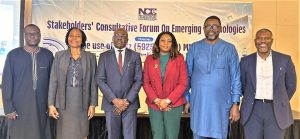Joy Agwunobi
L-R: Gbolahan Awonuga, executive secretary, Association of Licensed Telecom Operators of Nigeria (ALTON); Caroline Alenoghena, professor of Telecommunications Engineering, Federal University of Technology, Minna; Abraham Oshadami, executive commissioner, technical services, Nigerian Communications Commission (NCC); Sade Dada, public policy manager, Anglophone West Africa, Meta; Efosa Idehen, director, compliance monitoring and enforcement, NCC, and Tony Emoekpere, president, Association of Telecom Companies of Nigeria (ATCON), during a stakeholders’ consultative forum on Emerging Technologies hosted by the Commission in Lagos,recently.
The Nigerian Communications Commission (NCC) has taken steps to capitalise on the potential of the 6GHz spectrum to enhance internet speed and connectivity throughout the country. This initiative seeks to address capacity constraints on existing Wi-Fi bands and cater to the increasing demand for high-speed internet services.
The development was announced during a recent Stakeholders’ Consultative Forum on Emerging Technologies in Lagos. It follows an earlier call from the Global System for Mobile Communications Association (GSMA), urging the government to allocate the 6GHz spectrum band for mobile growth. The GSMA noted that the band is key to unlocking enhanced connectivity and driving global economic growth.
Nigeria now joins an expanding roster of countries embracing the 6GHz spectrum, which is projected to effectively address mounting mobile data demands and facilitate the evolution of future mobile networks.
The 6GHz spectrum is a range of radio frequencies that offers faster data rates and improved transmission speeds compared to older bands, making it a highly coveted resource in the race to provide superior internet services.
Speaking at the forum, Aminu Maida, the executive vice chairman of the NCC, represented by Abraham Oshadami, the executive commissioner of technical Services, stressed that the move to deploy the 6GHz spectrum is necessary due to the overwhelming demand on the existing 5GHz and 2.4GHz bands used for Wi-Fi.
“The 5GHz and 2.4GHz bands, which are currently being used for Wi-Fi (Wi-Fi 5), are becoming overwhelmed due to the increased capacity demand,” Maida explained.
The NCC EVC highlighted that the 6GHz spectrum offers significantly faster data rates and transmission speeds, which are ideal for Nigeria’s expanding digital landscape. He noted that the band, spanning from 5925 MHz to 7125 MHz, substantially increases available spectrum, crucial for supporting the rising demand for high-speed internet and advanced applications.
According to Maida, Wi-Fi plays a crucial role in distributing fixed broadband connectivity in homes, offices, and other environments, noting that most home internet traffic reaches end-users through Wi-Fi.
Maida added that in enterprise settings, Wi-Fi is essential for managing large data volumes, connecting numerous devices, and ensuring improved reliability, higher data throughput, and lower latencies.
Also speaking at the event, Atiku Lawal, head of spectrum administration at NCC, highlighted the limitations imposed by overcrowded airwaves in the 2.4GHz and 5GHz bands, which curtail the potential of Wi-Fi services in Nigeria.
He noted that more than seventy countries worldwide have already made the bold decision to open the 6GHz band for unlicensed Wi-Fi use or are currently in the process of considering this move.
Lawal further explained that depending on the particular implementation of the 6GHz spectrum in a country, this band could offer two to three times more spectrum than is currently available. This would allow for the use of 80MHz and 160MHz channels, which are necessary to support cutting-edge technologies such as Wi-Fi 6.
Lawal emphasised that these new technologies are vital for driving digital transformation, providing high-definition video services, and facilitating X Reality (XR) experiences
“The NCC’s decision to open the 6GHz frequency band for unlicensed Wi-Fi use will revolutionise broadband connectivity in Nigeria. This move will greatly improve internet services, offering faster and more reliable connections. With Wi-Fi 6, users can expect higher data rates and increased capacity, especially in high-demand environments such as stadiums, airports, and offices,” he said.
He also noted that by offloading devices from cellular networks to Wi-Fi 6, the NCC aims to improve the overall quality of service and boost broadband penetration in Nigeria.
On his part, Gbenga Adebayo, chairman of the Association of Licensed Telecom Operators of Nigeria (ALTON), urged the federal government to support operators in upgrading their infrastructure to accommodate the new spectrum.
Adebayo highlighted the financial challenges operators face in expanding their networks. He emphasised the need for financial assistance from the government, noting, “We require funding to upgrade infrastructure and import equipment to benefit from the 6GHz spectrum. Our members are struggling to expand their infrastructure.”









